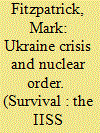| Srl | Item |
| 1 |
ID:
138947


|
|
|
|
|
| Summary/Abstract |
Russia, the United Kingdom and the United States extended security assurances to Ukraine in December 1994 in an agreement that became known as the Budapest Memorandum. This agreement was part of a package of arrangements whereby Ukraine transferred the Soviet-made nuclear weapons on its territory to Russia and acceded to the Treaty on the Non-Proliferation of Nuclear Weapons (NPT) as a non-nuclear weapon state (NNWS). Russia's violations of the Budapest Memorandum, notably its annexation of Crimea, could have far-reaching implications for nuclear non-proliferation and disarmament because of the questions that Russia's behaviour has raised about the reliability of major-power security assurances for NNWS parties to the NPT. Doubts about the reliability of such assurances could create incentives to initiate, retain or accelerate national nuclear weapons programs. Moreover, because the Budapest Memorandum included restatements of UN Charter provisions and principles articulated in the Helsinki Final Act of the Conference on Security and Co-operation in Europe, Russia's disregard for the Budapest Memorandum has raised fundamental questions about the future of international order. The Russians have demonstrated that, despite economic sanctions and international condemnation, they are prepared to disregard longstanding legal and political norms, including those expressed in the Budapest Memorandum, in pursuit of strategic and economic advantages and the fulfilment of national identity goals. Unless Russia reverses its dangerous course, the fate of the Budapest Memorandum may in retrospect stand out as a landmark in the breakdown of international order.
|
|
|
|
|
|
|
|
|
|
|
|
|
|
|
|
| 2 |
ID:
148608


|
|
|
| 3 |
ID:
132469


|
|
|
|
|
| Publication |
2014.
|
| Summary/Abstract |
On some issues, particularly Iran, the fallout has been negligible, yet there is still reason for concern. The gravest dangers are the devaluing of security assurances and cracks in the credibility of extended deterrence.
In the immediate aftermath of Russia's annexation of Crimea, gloomy predictions for the non-proliferation agenda were a commentariat staple. On some issues, particularly Iran, the fallout has so far been marginal. Yet there remains ample reason for concern, including over US-Russia cooperation on nuclear security. The gravest proliferation danger stemming from the crisis is the devaluing of security assurances of the kind provided to Ukraine in the 1994 Budapest Memorandum on Security Assurances and potential cracks in the credibility of extended deterrence.
|
|
|
|
|
|
|
|
|
|
|
|
|
|
|
|
| 4 |
ID:
143010


|
|
|
|
|
| Summary/Abstract |
The failure of the security assurances contained in the 1994 Budapest Memorandum to prevent Russia's annexation of Crimea and support for eastern Ukrainian separatists has been widely viewed as a serious blow to global nuclear nonproliferation efforts. In particular, observers have maintained that the experience will undermine the future value of security assurances in persuading countries to give up nuclear weapons capabilities or to continue refraining from acquiring them. Observers have also asserted that the experience will reinforce the lesson learned from such previous cases as Iraq and Libya that giving up nuclear weapons or nuclear weapons programs will make a country vulnerable to military attack.
|
|
|
|
|
|
|
|
|
|
|
|
|
|
|
|